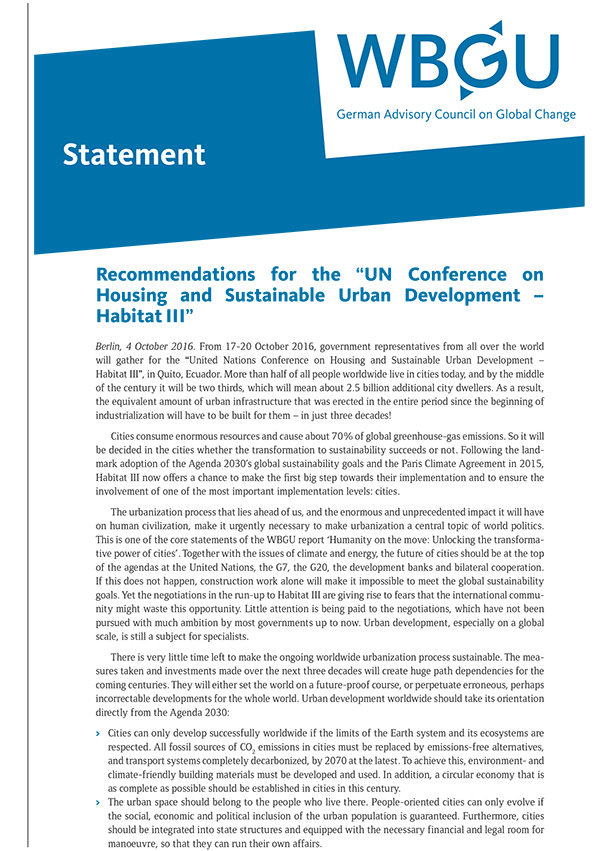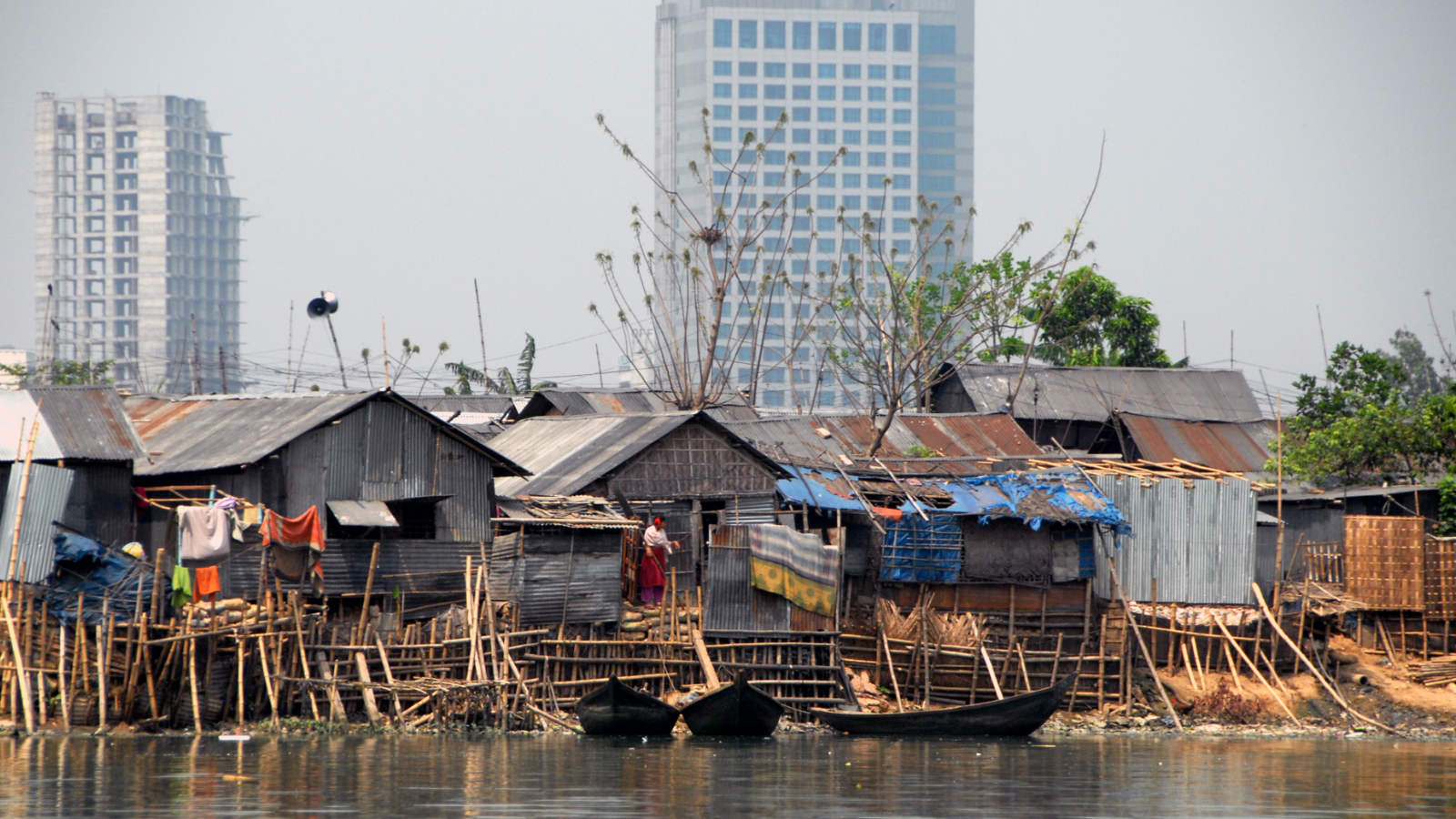
Recommendations for the “UN Conference on Housing and Sustainable Urban Development – Habitat III”

From 17-20 October 2016, government representatives from all over the world will gather for the “United Nations Conference on Housing and Sustainable Urban Development – Habitat III”, in Quito, Ecuador.
Overview
More about this topic
Cities consume enormous resources and cause about 70 % of global greenhouse-gas emissions. So it will be decided in the cities whether the transformation to sustainability succeeds or not. Following the landmark adoption of the Agenda 2030’s global sustainability goals and the Paris Climate Agreement in 2015, Habitat III now offers a chance to make the first big step towards their implementation and to ensure the involvement of one of the most important implementation levels: cities.
The urbanization process that lies ahead of us, and the enormous and unprecedented impact it will have on human civilization, make it urgently necessary to make urbanization a central topic of world politics. This is one of the core statements of the WBGU report ‘Humanity on the move: Unlocking the transformative power of cities’. Together with the issues of climate and energy, the future of cities should be at the top of the agendas at the United Nations, the G7, the G20, the development banks and bilateral cooperation. If this does not happen, construction work alone will make it impossible to meet the global sustainability goals. Yet the negotiations in the run-up to Habitat III are giving rise to fears that the international community might waste this opportunity. Little attention is being paid to the negotiations, which have not been pursued with much ambition by most governments up to now. Urban development, especially on a global scale, is still a subject for specialists.
There is very little time left to make the ongoing worldwide urbanization process sustainable. The measures taken and investments made over the next three decades will create huge path dependencies for the coming centuries. They will either set the world on a future-proof course, or perpetuate erroneous, perhaps incorrectable developments for the whole world. Urban development worldwide should take its orientation directly from the Agenda 2030:
- Cities can only develop successfully worldwide if the limits of the Earth system and its ecosystems are respected. All fossil sources of CO2 emissions in cities must be replaced by emissions-free alternatives, and transport systems completely decarbonized, by 2070 at the latest. To achieve this, environment- and climate-friendly building materials must be developed and used. In addition, a circular economy that is as complete as possible should be established in cities in this century.
- The urban space should belong to the people who live there. People-oriented cities can only evolve if the social, economic and political inclusion of the urban population is guaranteed. Furthermore, cities should be integrated into state structures and equipped with the necessary financial and legal room for manoeuvre, so that they can run their own affairs. Statement
- Urban quality of life depends on the Eigenart, or specific character, of cities. Historically evolved urbanity and creative spaces generate identity; public places and spaces allow exchange and community; architecture can express and encourage beauty, openness, humaneness and creativity instead of exclusion.
Urban spaces must be understood as areas of both protection and active participation. This involves granting people creative autonomy to live their cultural and individual diversity. In order for this to succeed, cities should be equipped with the necessary powers, and urban development should be pursued in an integrative and holistic manner. It should be borne in mind that more than half of all city dwellers live in towns and cities with fewer than a million inhabitants, and that growth is especially dynamic in small and medium-sized cities. Resources should not be concentrated on a small number of major and mega-cities; sprawling agglomerations should not be the future of urban development. Rather, the vision of polycentric city systems should be pursued. Polycentric structures improve quality of life in cities; they create social permeability and cultural diversity, and prevent the displacement of population groups to urban and regional peripheries. In addition, bringing more life into small and medium-sized cities can reduce disparities between town and country. Digitization, renewable energies and a circular economy can lay the foundations for polycentric urban landscapes; innovations in infrastructure and technology can support polycentric urban models.
Habitat III’s outcome should be measured by whether we succeed in putting urbanization at the top of the agenda of world politics. In addition to the global debate on climate change and the energy transformation, we need a global discussion on the impending surge of urbanization – which will be unique in terms of impact, scale and speed – and the associated need for action. It will be impossible to implement the Agenda 2030’s global sustainability goals or the Paris Climate Agreement unless cities develop accordingly.
We must not simply duplicate the type and the structure of most present-day cities. If we build future cities in the same way as we have in the past, we will not be able to comply with the planetary limits, and non-sustainable path dependencies will be cemented. We must therefore completely rethink the way we build, plan and structure cities worldwide and how we develop supply and mobility systems. Urban development needs a fundamental paradigm shift.
All over the world, the objective should be to create liveable cities for the entire urban population, to overcome social inequality, and to sustain the natural life-support systems. This requires above all the following:
- hold Habitat conferences every four years, not just every twenty,
- reform and strengthen the UN Habitat programme,
- create a panel for the scientific monitoring of international policy in the form of scientific assessment reports,
- make the issue a permanent item on the G20 agenda,
- strengthen the role of city networks in international politics,
- and give urbanization and urban development a higher profile in international and development cooperation, as well as in international research.
In Quito, the German federal government should vigorously promote such a fundamental paradigm shift in urban development policy.
German
- Download: Statement (PDF 86 KB)
English
- Download: Statement (PDF 75 KB)
